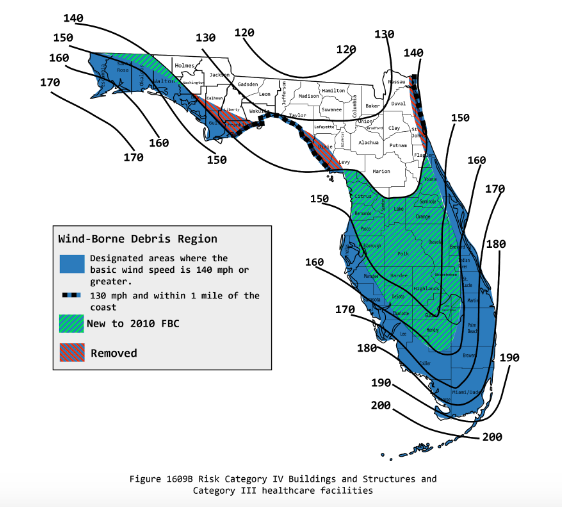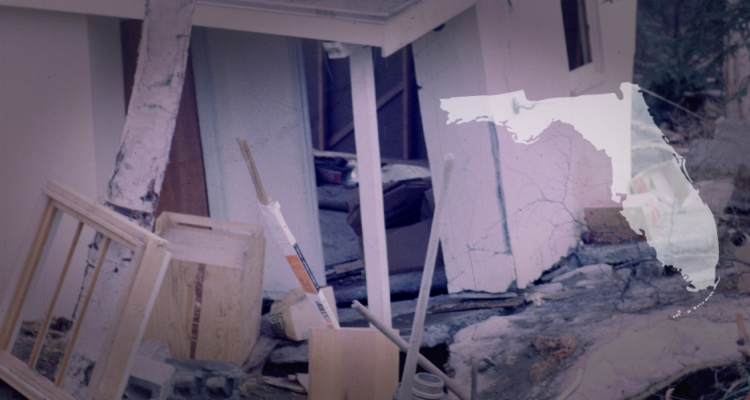What is an HVHZ?
HVHZ is an abbreviation that stands for “High Velocity Hurricane Zone.” These zones are part of the Florida Building Code, and they are named appropriately. High Velocity Hurricane Zones historically incur the worst damage from hurricanes, due to location alone. Other factors come into play when assessing individualized possible hurricane damage — such as the strength of your structure — but if you live in one of these hurricane-prone coastal locations, it is important to take extra care during hurricane season.
Building products that are used in these zones must be tested to withstand the most severe weather. The Florida Building Code has adopted some of the toughest standards to help save and protect lives.
Floridians in Miami/Dade, Broward, or Coastal Palm Beach Counties are in an HVHZ, or High Velocity Hurricane Zone. Of the 292 hurricanes that have hit the U.S. since 1851, a staggering 120 have made some sort of landfall in Florida and 57 of them have hit Broward and Miami-Dade County. High velocity storms and wind also expand into nearby counties up the coast.
Other states besides Florida contain similar codes, but sometimes with a different name— so check with your state building codes and/or licensed contractor if you live in another state and want to know if you are in an HVHZ.

What Factors Determine if a Region is in an HVHZ?
The HVHZ is part of the larger Wind-Borne Debris region, and encompasses the areas where the maximum design wind speed is 140 mph or more.
The ICC (International Code Council) defines the following:
Hurricane-Prone Regions: Areas vulnerable to hurricanes defined as:
The U.S. Atlantic Ocean and Gulf of Mexico coasts where the basic wind speed in greater than 90 mph (40 m/s) and Hawaii, Puerto Rico, Guam, Virgin Islands, and American Samoa.
Wind-Borne Debris Region: Portions of hurricane-prone regions that are within 1 mile (1.61 km) of the coastal mean high water line where the basic wind speed is 110 mph (48 m/s) or greater, or portions of hurricane-prone regions where the basic wind speed is 120 mph (53 m/s or greater; or Hawaii.)
Why Is It Important to Know if You Live in an HVHZ?
Certain cities and counties in Florida, such as Miami-Dade and Broward County, have developed stricter building code standards and product approval systems over time to satisfy higher HVHZ performance program standards. Construction and building professionals are well versed in the changing building codes and rigorous product approval requirements. Specific products or building components must be HVHZ authorized if you live in certain high velocity hurricane zones. Make sure to check your official Florida Building Codes to ensure you are within code.
If you live in an area designated as an HVHZ (or equivalent), then you need to make sure you choose products that meets these codes, and an installer who is knowledgeable about them. Always remember to check products and companies you use for an HVHZ approval if you live in an HVHZ zone or nearby to one. Purchasing products such as windows, doors, and other hurricane protection methods with an HVHZ approval may be necessary in your location, and failing to do so can be a violation to Florida building codes. If you don’t live in a high velocity hurricane zone, it still can be useful to look for these approvals because you can be sure those products are strong and functional.
Hurricanes can cause massive damage, as demonstrated by Hurricane Andrew in 1992, Hurricane Floyd in 1999, Charley in 2004, and Katrina, Rita, and Wilma in 2005. Flying debris will break normal windows, which can cause a sudden internal pressurization within your home. This is the most common cause of most roof failures.
Be wary when purchasing doors, windows, or other hurricane damage prevention products. Make sure that they are Miami/Dade High Velocity Hurricane Zone (HVHZ) approved. If not, not only do you run the risk of potentially opening up your home or business to hurricane damage, but you may also be in violation of a Florida building code.
It is always important to research and ask questions when investing in hurricane protection. Even windows or hurricane screens that are marketed for hurricane protection may not be approved for use in high velocity hurricane zones. These products may work in a smaller storm, but could fail you if the storm reaches a certain wind speed.
How Armor Screen Can Help
All Armor Screen systems are Miami/Dade High Velocity Hurricane Zone (HVHZ) Approved, ensuring the highest strength and quality. When it comes to protection you can trust, there is no company more reliable than Armor Screen.Whether you live in a High Velocity Hurricane Zone, near to one, or just would like more storm protection for your home or business, Armor Screen can help to provide you with the ideal products to fit your needs. Call us today at 877-237-2337, or request a quote online to find out more about what custom solution Armor Screen can provide for you. Don’t go unprepared this hurricane season, especially if you’re in a high velocity hurricane zone!




